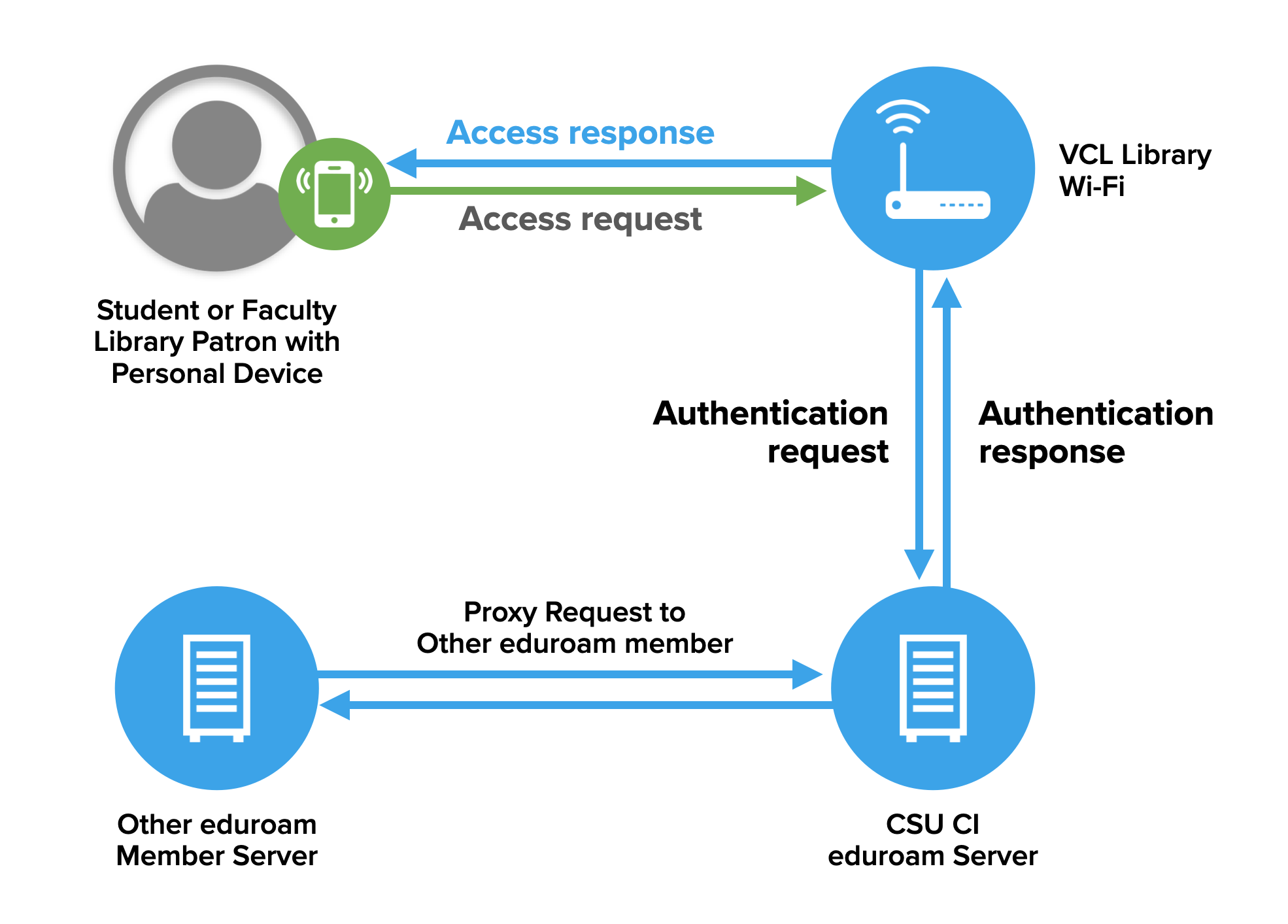It was during a CENIC Board of Directors meeting when Ventura County Library Director Nancy Schram first heard of eduroam, the secure, world-wide roaming access service developed for the international research and education community that allows students, researchers, and staff from participating institutions to obtain Internet connectivity across campus and when visiting other participating institutions by simply opening their laptops.
Schram immediately saw how useful it would be for the Ventura County Library system to offer eduroam connectivity to student and faculty residents of the sprawling 2,200-square-mile county. In such a large county, many students and faculty have long commutes to the nearest college or university campus where they can access eduroam, presenting an inconvenience for both in-person and online teaching and learning. For most Ventura County students and faculty, the 13 branches of the county library system are closer and more conveniently situated than their campuses.
Therefore, by becoming eduroam Hotspot Operators, the county library and its branches could offer the extremely valuable service of eduroam connectivity to its student and faculty residents. After learning about eduroam, Schram opened up a conversation with former Dean of Libraries Alicia Virtue at CSU Channel Islands to move forward with this idea.
Moreover, Schram feels that other libraries could find great value in becoming eduroam Hotspot Operators, saying, “The more public libraries choose to offer eduroam connectivity, the more seamless and convenient the eduroam experience will become throughout California, especially in remote areas where many student and faculty residents are closer to their local library than to their campus, or where they may simply not have sufficient connectivity at home to engage in teaching and learning.”

Eduroam is a secure, global Wi-Fi service that allows students, researchers, and staff from participating institutions to access the Internet and other resources specific to their programs when visiting other member institutions. Connectivity is automatic and seamless for anyone with pre-existing eduroam login credentials and works the same way whether the user is on their home campus or anywhere else in the world that provides eduroam access.
Connectivity to eduroam can also be provided by organizations that choose to operate as eduroam Hotspot Operators, which may or may not be eduroam participants. Such organizations, including the libraries and branches of the Ventura County Library system (not an eduroam participant), act as Wi-Fi “front doors” to eduroam.

An eduroam Identity Provider, typically an eduroam participant and Hotspot Operator, determines whether this “front door” is opened and a connection request is permitted to continue on from a user’s phone, tablet, or laptop to another eduroam member institution. The Identity Provider acts as a doorman, checking the credentials of the user and device making the connection request and then approving or denying this request. Thus, any student or member of the faculty or staff of an eduroam participant who walks into one of these libraries can connect automatically to their home campus or any other eduroam member institution in the world through the library’s eduroam hotspot.
The phones, tablets, and laptops of patrons who do not have eduroam login credentials will see only the library’s regular Wi-Fi.
For the branches of the Ventura County Library system, the role of the Identity Provider is played by fellow CENIC member CSU Channel Islands, the only major state university in the county and a natural partner in the library system’s desire to better serve its patrons in research and education. Thus, all eduroam connection requests made through Ventura County Library hotspots are verified over CalREN by eduroam and CSU Channel Islands, and legitimate requests are permitted to continue on to eduroam.
Timothy Tuitama, Office Systems Coordinator III at the Ventura County Library, was instrumental in implementing the library’s eduroam hotspot. “Setting up eduroam was straightforward, requiring only a few steps, and Internet2 was very helpful in answering our questions throughout the process,” Tuitama stated. “Once it was live, we immediately saw students connecting and using our Wi-Fi. We also quickly added staff to the monthly reporting emails. Overall, it was a smooth and seamless implementation.”

The convenience this service brings to library patrons who are members of the state’s research and education community is immense, especially in a large county like Ventura. Public libraries are often the most convenient places for anyone in a remote or rural area to access the Internet at broadband speeds. Given the ubiquity of hybrid and virtual teaching and learning today, libraries have begun to play an important role in delivering teaching and learning to these areas, in addition to the many other services they provide to their patrons.
Offering eduroam connectivity identical to that on a patron’s own campus enables libraries to fulfill this role even more thoroughly—especially given the ease and simplicity with which a library can become a Hotspot Operator.
Schram is quick to point out the value that libraries can bring to their patrons in many areas of California, not only remote and rural areas. “Becoming a Hotspot Operator enables libraries to serve patrons in both urban and rural areas; driving distance is an obstacle for patrons in remote areas, but traffic can make commutes to campus just as onerous in urban settings,” she said. “Libraries can also fill in gaps in eduroam coverage that would otherwise be extremely difficult to fill. The Ventura County Library, for example, is the only eduroam Hotspot Operator between CSU Channel Islands and UC Santa Barbara.”
Directors at any of California’s public libraries can leverage their CENIC membership to learn more about becoming an eduroam Hotspot Operator—and working together with another CENIC member as an Identity Provider—by reaching out to the CENIC Project Management Office.